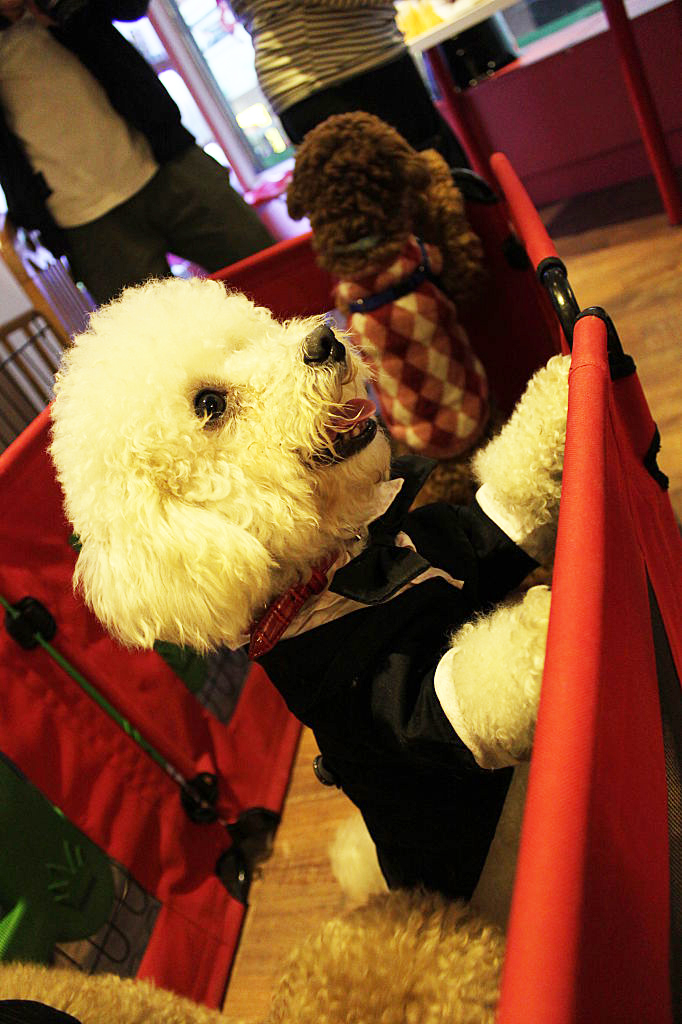Spa days for Hong Kong’s pampered pets
Reporter: Amy Leung
Walk along almost any street in Hong Kong and you will find dog owners carrying around their pets in their arms. These canines are immaculately coiffed and dressed in designer clothing with matching accessories.
Dogs are no longer kept for utilitarian purposes, to guard their owners’ premises or even for simple companionship. Some of today’s owners treat their pets as their children, their most precious possessions or even as status symbols and style statements. The mushrooming of pet–grooming shops and spas is evidence of such trends.
Academy of Modern Pet Ltd., which was established in 2007, is one of the pioneers in the pet grooming and pampering industry.
Sandra Cheung, the principal of this pet-grooming school, has been working in the industry for nearly two decades. The school offers a variety of professional training courses for people who are interested in becoming pet-groomers. These courses can cost up to $43,500 and topics covered include how to clip the fur of different breeds of dogs, how to dye their coats, their biology and anatomy, and business management.
“Being a pet-groomer can be treated as a job as well as an interest,” says Cheung, “that is why it is so welcomed by the public.”
However, Cheung stresses that when she started the business, her aim was not to make money. Likewise, she says most of her students attend the pet-grooming courses not because they want to turn their expertise into a business, but simply out of their love for animals.
In addition to the professional courses, the school also offers many short courses on how to care for and groom individual breeds of dogs, including how to groom them for dog shows. Students come from all walks of life; there are men and women, teenagers and homemakers, and their ages range from 14 to 62. “Because you love the pets, you will feel the time fly,” says Cheung.
According to Cheung, the industry really started to take off around 2006, when “bear bear poodle style”, which means a dog that is groomed like a teddy bear, became popular. “When the pet is beautiful, the owner feels happy. In return, the pets will feel the same too,” she says.
Cheung jokes that the look of a dog follows the interests of its owner. “How they dress their pets can definitely reflect their taste.”
People’s attitudes towards their pets and how they look have certainly changed over the years but to further develop the industry Cheung believes people need to look beyond Hong Kong. Therefore, she provides her students with opportunities for technical exchange, visits and international competitions. They travel to the mainland, to Japan and even the United States to acquire a deeper understanding of industry trends and apply what they have learnt.
“The world is ever-changing,” she says, “being in this industry, you must have a sense of the new products and inventions.”
Although not as experienced as Cheung, Shuet May has been a pet-groomer for nearly six years and opened her own grooming shop “Pet Fantasy” in 2005.
She went to Japan to learn the new trends in pet health and beauty treatments, and introduced some new facilities to Hong Kong. Pet Fantasy is one of the two shops in Hong Kong that provide something called the “Micro Bubble Pet Spa”. She describes the spa as similar to skincare treatments for humans. “It is a deep-cleansing procedure,” she explains enthusiastically. “The micro bubbles are so tiny that they can get into the pets’ pores and remove the dirt.”
Prices for the treatment range from $280 to $580 depending on the size of the dog; clipping and shearing costs extra. May says the prospects for the pet-grooming business are good because more people are willing to spend money to groom their pets.
“For people owning pets these days, it is just like having one more child at home,” May says. “They treat them like children.”
Most of the customers in her shop are young couples, but she also notices there have been more men, mostly single, visiting her shop in recent years. She attributes this to owners who view pet keeping as an activity through which they can socialize. “When the masters walk their dogs at night, they often stop and chat with each other,” says May. “It is a good chance to make friends with people with the same interest.”
Sometimes, owners will watch their pets having all the treatments, but most of the time they simply drop their pets at May’s shop for a few hours and pick them up later. May says that every time she hands the pets back to their owners, she feels like a teacher meeting parents. “It is as though I were giving out report cards after school. I have to report their performance in detail,” she says with an understanding smile.







































